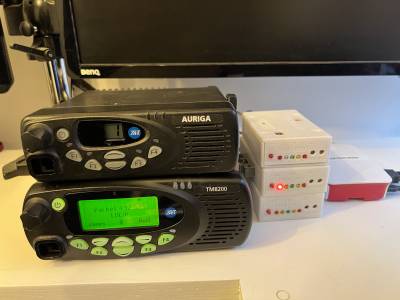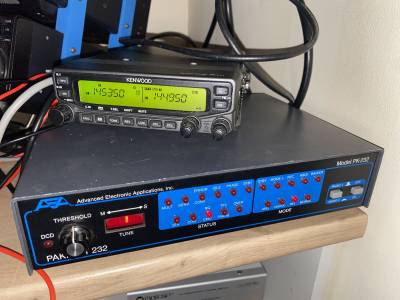Table of Contents
National Packet Update - March 2023
Introduction
Welcome to the first update on the National Packet Project! It's hoped it'll help keep people up to date on the progress we've made, generate some interest and spark some conversations.
First, a brief introduction. Packet Radio gained popularity in the amateur radio community in the 80s and 90s as a method of transmitting data split into “packets” across the country and even further afield, before the internet was widely available. This data could have consisted of “e-mail” style and real-time chat messages, as well as documents, computer programs or anything else compact enough to be sent over a bandwidth constrained link.
Various modulations and encodings exist, but the most popular proved to be AX.25 over 1200 Baud AFSK over VHF/UHF links, and 300 baud FSK over HF. To get a packet from one end the country to another, networks of “nodes” popped up that could relay a packet to other neighbouring nodes, over either a shared channel, or a direct link with a dedicated frequency to avoid collisions. Over time, additional protocols were implemented to route packets automatically and improve efficiency.
As the internet gained popularity, interest in packet radio dwindled and nodes slowly shutdown until packet radio in the UK was all but extinct. However, in the last couple of years there has been a renewed interest in packet radio, as radio amateurs seek out ways of building data networks that do not depend on the public internet.
Members of the Online Amateur Radio Community (OARC) recently started working on a project to rebuild a national packet network, and welcome collaborating with other groups and individuals interested in packet radio to help make it happen.
Progress
The project kicked off in November 2022 when Tom M0LTE kindly arranged a group buy of NinoTNC kits - a Hardware TNC (Terminal Node Controller) that can support traditional 1200 and 9600 Baud packet as well as some more experimental modes. Tom meticulously put together almost 50 kits which were sent out for members to construct and put into service. Thanks Tom!
In December, Nino KK4HEJ, the creator of the NinoTNC, and Tadd KA2DEW, packet guru, maintainer of tarpn.net, and champion of the North Carolina Packet network (ncpacket.net), hosted an informative and engaging discussion covering everything NinoTNC, TARPN, and Packet Networks which further inspired members to build a network of our own.
Eoin M0NVK has put up a new 2M node (GB7IOW) in Newport on the Isle of Wight, consisting of a Tait T2010 and NinoTNC kindly supplied by Robin M0JQQ. It's able to reach an existing node in Southampton, GB7SOU, and some local amateurs have already been spotted exploring the new node.
Francis M0OKF put up GB7OUK in Milton Keynes earlier this year and has recently added a 70cm port running at 9600 baud, and can also reach GB7MNK
Tom M0LTE has recently added an additional 6m port to GB7RDG in Tilehurst, West Reading. It's currently reserved for experimentation so availability and modes are subject to change. GB7RDG can reach GB7WOD, and there's a number of active packet users in the surrounding area accessing the nodes.
Denis G4KWT has also been issued NoVs for his Node GB7WOD in Woodley East Reading for both 2M and 70cm (9600 baud), and can reach GB7RDG and surrounding users.
Robin M0JQQ has been getting to grips with programming and interfacing with the Tait T2000 series as well as experimenting with packet over HF with other members.
Matthew 2E0SIP, Mike 2M0MQN and Nathan MM3NDH have been experimenting with various packet software in “lab” environments to get a better understanding of how they're configured and how they can help the project, and Nathan also experimented with running IP over AX.25
A number of recent posts have been spotted on social media from people enquiring about TNCs and Packet, and in the last week a number of amateurs have expressed an interest in getting involved, so things look to be gaining momentum which is encouraging.
Next Steps
This is a non-exhaustive list of some of the things we're hoping to achieve in the near future.
- Create a proposal for a node that could be deployed at a remote site. Ideally something repeatable, that wouldn't look out of place at a commercial site.
- Evaluate the various software packages available to create a stable, light weight, low maintenance NET/ROM enabled node for a remote site.
- Create an image or installation script to simplify creating a packet node.
- Continue to add new nodes and links to the network.
- Get some packets routing longer distance, between cities/towns/regions
- Experiment and have fun!
How to get involved
- Join the OARC Discord server ( https://www.oarc.uk/join ) and checkout the #national-packet-project channel
- Join the UK Packet Radio mailing list https://groups.io/g/ukpacketradio/
- See https://packet.oarc.uk for further information, tutorials etc. [As with this project, this page is a work in progress!]
- Build a node and get it on the air, or see if you can hit any of the existing nodes
- Look out for future updates to see how things are progressing

